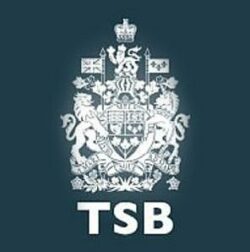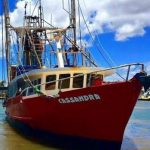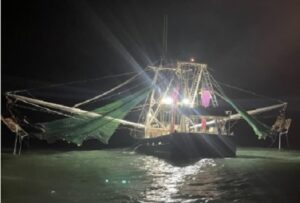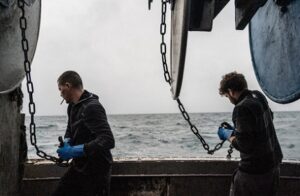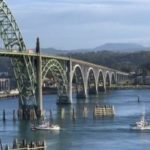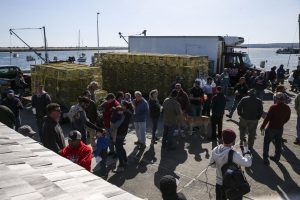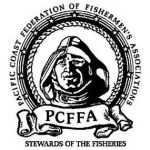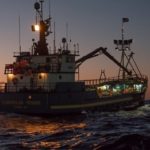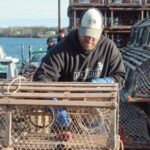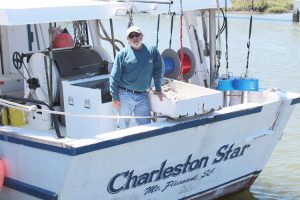Tag Archives: Transportation Safety Board of Canada
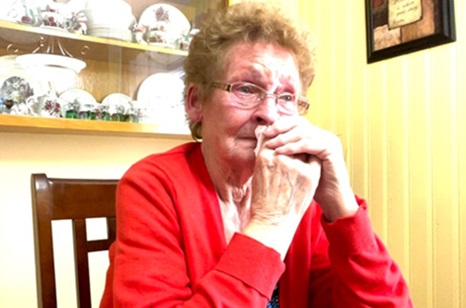
The fatal truth about commercial fishing
A note from the authors: Dear readers, we have wanted to cover this story for a long time. Given the fishing tragedies this province has endured, we acknowledge this is a difficult subject. This reporting honours those lost at sea, doing what they loved most: fishing. We recognize the collective grief of families, communities and the entire province. We hope this work illuminates what’s going wrong on the water and helps bring more fish harvesters home safely. Inshore harvesters dealing with trauma after incidents like the ones we describe can access PTSD coverage through workers’ compensation (WorkplaceNL). For anyone else, 811 can connect you with mental health supports in your community.
“My god, what are you doing to me?” says Brenda Gould, remembering the words she shouted into the sky that fateful day in 1989. The Port au Choix woman had just learned that her 22-year-old son Brendan, known as Ben, drowned while fishing off the coast of the Northern Peninsula. It wasn’t the first time tragedy knocked at Gould’s door. Eleven years earlier, in 1978, her husband Gabriel, 35, also drowned while fishing. Photos, Video, more, >>CLICK TO READ<< 17:41
Report says fatigue, lack of safety oversight contributed to crewmember death on Nunavut fishing vessel
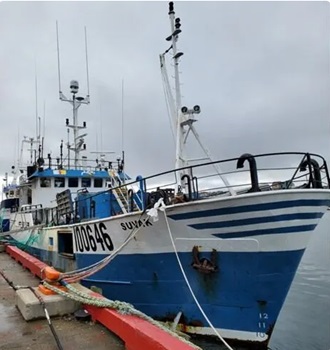 The death of a worker (fisherman)who went overboard on a fishing vessel in Nunavut in 2021 highlights gaps in safety management on that boat and similar vessels in the territories, according to an investigation report released Thursday. The report was done by the Transportation Safety Board of Canada (TSB), which looks into marine, rail and air incidents but does not assign fault or determine criminal liability. It looked at the circumstances around the death of a crew member who died in August 2021 while working aboard the Iqaluit-based fishing vessel Suvak. The worker was pulled overboard when his arm became entangled in a buoy line. He was recovered from the water and later pronounced dead, the report states. more, >>click to read<< 11:03
The death of a worker (fisherman)who went overboard on a fishing vessel in Nunavut in 2021 highlights gaps in safety management on that boat and similar vessels in the territories, according to an investigation report released Thursday. The report was done by the Transportation Safety Board of Canada (TSB), which looks into marine, rail and air incidents but does not assign fault or determine criminal liability. It looked at the circumstances around the death of a crew member who died in August 2021 while working aboard the Iqaluit-based fishing vessel Suvak. The worker was pulled overboard when his arm became entangled in a buoy line. He was recovered from the water and later pronounced dead, the report states. more, >>click to read<< 11:03
May deaths of two New Brunswick fishermen prompt advisory letter from TSB
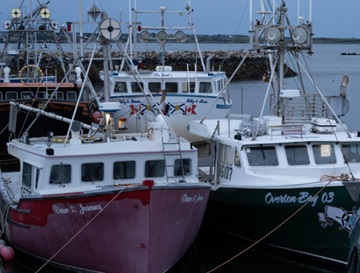 The Transportation Safety Board of Canada has issued a warning to three government bodies about overloading fishing boats, in response to the deaths of two New Brunswick lobster fishermen earlier this year. Fifty-eight-year-old Eugene Beaudin and his 33-year-old great-nephew, Normand Beaudin, fell off their fishing boat and died in the water off Miscou Island, N.B., on May 6. In the Oct. 30 letter to Transport Canada, Fisheries and Oceans Canada and WorkSafeNB, the safety board’s director of marine investigations, Clifford Harvey, wrote that the vessel Tracy Dawn left the harbour loaded with 119 traps and encountered rough weather. Harvey says the fishers fell overboard trying to drop traps into the water. >>click to read<< 18:50
The Transportation Safety Board of Canada has issued a warning to three government bodies about overloading fishing boats, in response to the deaths of two New Brunswick lobster fishermen earlier this year. Fifty-eight-year-old Eugene Beaudin and his 33-year-old great-nephew, Normand Beaudin, fell off their fishing boat and died in the water off Miscou Island, N.B., on May 6. In the Oct. 30 letter to Transport Canada, Fisheries and Oceans Canada and WorkSafeNB, the safety board’s director of marine investigations, Clifford Harvey, wrote that the vessel Tracy Dawn left the harbour loaded with 119 traps and encountered rough weather. Harvey says the fishers fell overboard trying to drop traps into the water. >>click to read<< 18:50
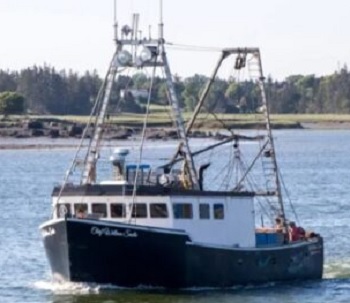
TSB report on sinking that killed 6 says fishing boat needed stability test
The report released Wednesday says the F/V Chief William Saulis should have been tested for stability, given the fact that major changes had been made to the boat by its owners. They had added a heavy, A-frame structure for scallop dragging, a protective plate to the boat’s stern, and covers to close drainage holes. On Dec. 15, 2020, the modified vessel capsized in the Bay of Fundy during a gale as it returned to its home port in Digby, N.S. All six crew on board died. The independent agency says Transport Canada inspectors during a 2017 visit didn’t tell Yarmouth Sea Products Ltd. that the modifications to the boat were stability “risk factors,” which were defined in a federal safety bulletin and questionnaire. However, the board made clear in its report and during Wednesday’s news conference that it has long urged a stricter law on stability assessments and that Transport Canada hasn’t complied. >click to read< 14:23
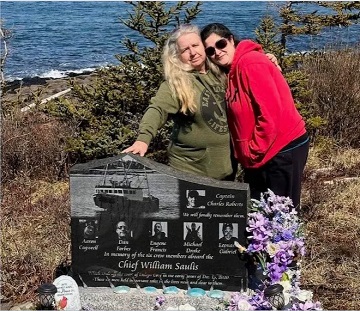
‘We’re not going to stop fighting’: Families of F/V Chief William Saulis crew to keep pushing for safety in fishing industry
Michelle Nickerson-Forbes had worried that the longer it took for the Transportation Safety Board to come out with its report about the December 2020 fatal sinking of the Chief William Saulis scallop vessel, that people would forget about the six-member crew whose lives were lost. Initially, the Transportation Safety Board (TSB) had said the investigation and report would take up to 450 days. Instead, it took over two years. Lori Cogswell Phillips, a resident of Cambridge in the Annapolis Valley, is also never going to give up. She’s been fighting for answers on behalf of her son Aaron Cogswell and the rest of the Chief William Saulis crew for the past two-plus years. She says the TSB report – which took too long to come out – still leaves more questions unanswered than answered. Photos, >click to read< 09:51
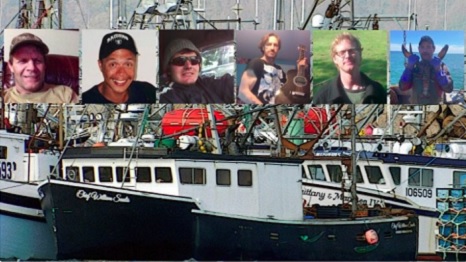
TSB investigation into fatal sinking of F/V Chief William Saulis recommends improved safety procedure awareness
The Transportation Safety Board of Canada recommends inspections of commercial fishing vessels verify that required written safety procedures are available to crews and that they are knowledgeable of these procedures. The recommendation to the Department of Transport was issued Wednesday as part of the investigation into the fatal 2020 sinking of the scallop boat F/V Chief William Saulis near Digby, resulting in the death of one crew member. Five crew members are still classified as missing. On Dec. 15, 2020, shortly after midnight, the Chief William Saulis, with six crew members onboard, departed Chignecto Bay, N.B., to return to port in Digby. At about 5:50 a.m., the vessel’s emergency position-indicating radio beacon activated about 12 nautical miles off the coast of Digby. >click to read< 14:37
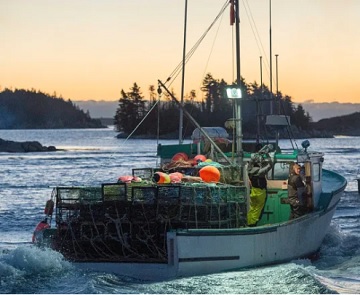
Transportation Safety Board calls for greater attention to safety in commercial fishing
The Transportation Safety Board of Canada is calling for greater attention to safety on commercial fishing vessels as the industry remains one of the most dangerous in the country. Over the last two decades, there has been an average of nearly a dozen deaths per year. The most recent was Christian Atwood, who went overboard from a lobster boat on Boxing Day off Cape Sable Island, N.S.. The TSB is investigating that case. Glenn Budden, senior marine investigator for the organization, said there have been some improvements over the past few years, such as subsidies to buy safety equipment, but he’d like to see more done. >click to read< 07:24
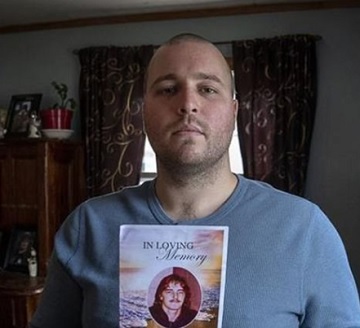
Transport Canada must be ‘more vigilant,’ relatives say two years after N.S. sinking
“My father said, ‘After this trip, this was it,’ because it was quite dangerous,” Michael Francis said during a recent interview at his home in Milton, N.S., a few weeks before the second anniversary of the sinking of the Chief William Saulis. The bodies of Eugene (Geno)Michael Francis, Aaron Cogswell, Leonard Gabriel, Dan Forbes and captain Charles Roberts were never recovered after the 17-metre vessel capsized on Dec. 15, 2020, just off Delaps 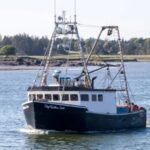 Cove, about 50 kilometres north of Digby, N.S. The body of crew member Michael Drake was swept up on the rocky shoreline. Two years later, Francis and Lori Phillips, the mother of Cogswell, say Dec. 15 is a date that provokes painful memories, unanswered questions and frustration over a Transportation Safety Board investigation that still hasn’t officially delivered its findings. >click to read< 08:43 >Search Results for Chief William Saulis<
Cove, about 50 kilometres north of Digby, N.S. The body of crew member Michael Drake was swept up on the rocky shoreline. Two years later, Francis and Lori Phillips, the mother of Cogswell, say Dec. 15 is a date that provokes painful memories, unanswered questions and frustration over a Transportation Safety Board investigation that still hasn’t officially delivered its findings. >click to read< 08:43 >Search Results for Chief William Saulis<
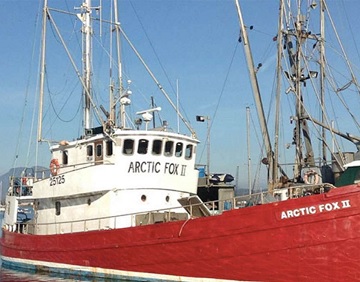
Poor boat maintenance led to fatal sinking of fishing vessel near Bamfield
Poor boat maintenance contributed to the sinking of a fishing vessel near Bamfield two years ago that killed two crew members, according to a Transportation Safety Board of Canada report released Tuesday. Two fishermen died and one was rescued on Aug. 11, 2020, after a commercial tuna fishing boat that left Cowichan Bay capsized off Washington state. In the early morning hours, the F/V Arctic Fox II reported taking on water. The master attempted to deal with the water and ordered the crew members to prepare to abandon the vessel. >click to read< 13:46
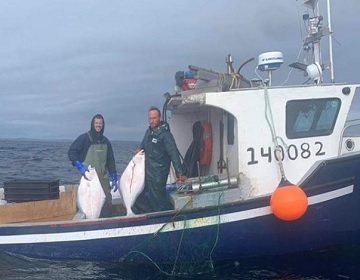
Calls for change continue 1 year after fishermen die off Labrador coast
It’s been one year since fishermen Marc Russell and Joey Jenkins left the wharf in Mary’s Harbour to gather their nets for the last time. The two fishermen died off the southern coast of Labrador on Sept. 17 of last year. Their fishing vessel, the Island Lady, was last seen in the afternoon. No distress calls were received. “It can’t just be an anniversary, briefly. Something more needs to come out of it. No other family should have to grieve like this,” said Niki Greeley, a Lodge Bay resident and Jenkins’s common-law partner. The search on Sept. 17 last year started after Russell’s father noticed his son wasn’t on social media as usual that Friday night. His father called around and found out the boat wasn’t back at the wharf. >click to read< 08:24
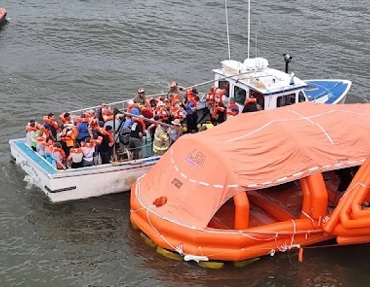
P.E.I.-N.S. ferry cancelled for a 2nd day after fire aboard ship forced evacuation Friday
Ferry trips on the route connecting Nova Scotia and Prince Edward Island have been cancelled for a second day after a fire on Friday forced an emergency evacuation of a vessel’s passengers. More than 200 people were safely evacuated from MV Holiday Island after a fire broke out in the vessel’s engine room at around 11 a.m. Cormier said there were no injuries to passengers or crew. Myles MacDonald, an auxiliary Coast Guard member who also fishes crab and scallops out of Wood Islands, rushed to the scene in his boat when he heard the ferry had caught fire. He pulled up alongside the Holiday Island as passengers hopped down an evacuation chute into a rubber dinghy. From there, they climbed onto his fishing boat. photos, >click to read< 08:27

TSB: Island Lady likely sank quickly and with no warning
Unable to examine a vessel that cannot be found, the Transportation Safety Board of Canada said Wednesday it cannot say what happened to a small fishing vessel that disappeared last year off the coast of southern Labrador. Marc Russell and Joey Jenkins of Mary’s Harbour were last seen Sept. 17 aboard the Island Lady, which fished from Mary’s Harbour. The pair had headed out to fish for cod. “The TSB’s investigation into this occurrence could not determine with certainty the cause of the disappearance of the Island Lady,” the board said in a statement Wednesday. >click to read< 14:42

Commercial fishing deaths in Canada hit 20-year high
Despite improvements in safety training and awareness, commercial fishing remains one of the most dangerous professions in Canada. The Transportation Safety Board of Canada reports that 45 workers died between 2018 and 2020, the highest three-year total in 20 years. And fishing safety has been on the board’s watchlist of important safety matters since 2010. But fishing fatalities are preventable. The Transportation Safety Board also reports that 29 workers died between 2015 and 2021 after their boats capsized or sank without personal floatation devices or distress-alerting devices. “You’ve got to be prepared for the worst-case scenario, and that’s where we see that they’re not prepared,” said Glenn Budden. >click to read< 19:03
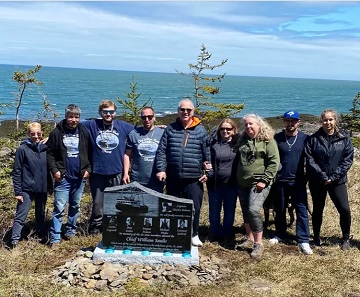
‘The spot is beautiful’: Chief William Saulis crew remembered with memorial
Lori Phillips was at a loss. She didn’t want to go to just any random cemetery and place a headstone with her son Aaron’s name on it. She would have no relationship to that spot, she says. It would just be a stone on a piece of land. Her son, Aaron Cogswell, was one of six fishermen who lost their lives in the Dec. 15, 2020, sinking of the Chief William Saulis scallop dragger. The others were Charles Roberts, Daniel Forbes, Michael Drake, Eugene Francis, and Leonard Gabriel. Phillips needed a place for her and others to remember the crew. >click to read< 09:01
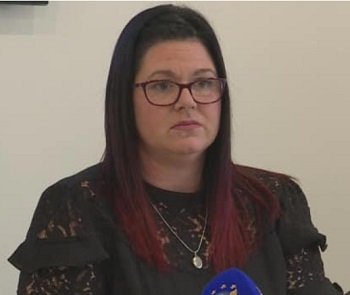
Report on deaths of 4 fishermen in Placentia Bay leaves family still looking for answers
The wife of a fisherman who died when the Sarah Anne fishing boat sank nearly two years ago says her family is still without answers, following the release of the Transportation Safety Board of Canada’s investigation report Wednesday. Melissa Mayo-Norman said Wednesday was an emotional day for her and the other families, who are still mourning the May 2020 loss of the Sarah Anne’s four-man crew of Scott Norman, 35, Mayo-Norman’s husband, Eddie Joe Norman, 67, Jody Norman, 42, and Isaac Kettle, 33, all from St. Lawrence, on Newfoundland’s Burin Peninsula. “We were hoping for some closure, which we didn’t receive,” Mayo-Norman said. “Unfortunately we were given no answers as to what may have happened that day, only what recommendations they could give for the Newfoundland fishermen.” > click to read < 09:11
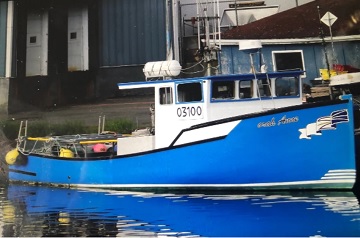
TSB Report: F/V Sarah Anne likely capsized suddenly, causing the deaths of all 4 men aboard.
Clifford Harvey, the Transportation Safety Board of Canada’s director of marine investigation, said the absence of life-saving equipment and distress signals support the conclusion that the vessel’s capsizing took the crew by surprise. The crew, skipper Eddie Joe Norman, 67; his son, Scott Norman, 35; his nephew, Jody Norman, 42, and Isaac Kettle, 33, left St. Lawrence, on Newfoundland’s Burin Peninsula, shortly after midnight on May 25, 2020, to fish for snow crab in Placentia Bay. The vessel was last seen 10:30 a.m. that day and was reported missing at 7:45 p.m. when it was overdue for its return. Harvey said the Sarah Anne was not equipped with a vessel monitoring system or an automatic identification system. >click to read< 11:40
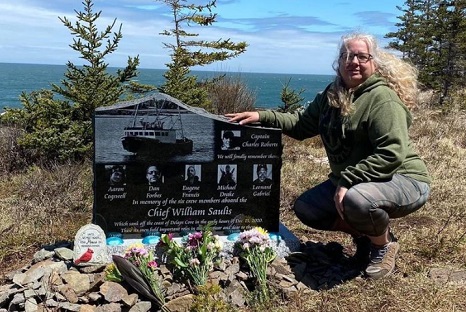
Questions linger for mother as monument erected for lost fishermen in Nova Scotia
Questions about how a scallop dragger sank suddenly in 2020 are lingering for a crew member’s mother, who this week installed a stone monument close to where the boat was lost. The bodies of Aaron Cogswell, Leonard Gabriel, Dan Forbes, Geno Francis and captain Charles Roberts were never found after the sinking of the Chief William Saulis on Dec. 15, 2020. The body of crew member Michael Drake came ashore near Delaps Cove, a coastal village about 50 kilometres north of Digby, N.S. Lori Phillips, Cogswell’s mother, has worked alongside Darlene Roberts, the wife of the captain, to create a stone memorial to honour the men on a wilderness trail within sight of the coastal waters where the dragger went down. >please click to read< 16:22

F/V Mucktown Girl: TSB weighing what steps they will take next, including opening an investigation
The F/V Mucktown Girl halibut boat went down off the coast of Canso, N.S., on Sunday. Four of its five crew members were rescued by the Canadian Coast Guard, but the fifth man fell off a life raft as the crew was being transferred to a coast guard vessel around 6:30 a.m. Sunday. The fisherman, Jeremy Hart of Windsor Junction, N.S., was eventually pulled out after spending five hours in the ocean but died in a hospital on Sunday. Board spokesperson Chris Krepski said Tuesday the TSB has been notified of the situation and is assessing what the next steps will be. >click to read< 22:17
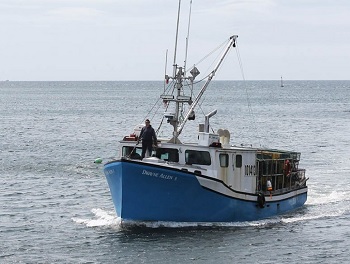
Safety on the Water Must Take Precedent
The year 2020 is nearly in the rearview mirror. Feel free to take a moment and let out a collective sigh of relief here. Who knows what 2021 has in store for us, but could it possibly be any more strange, troubling or unprecedented than the last 12 months? This past year will go down in history as one of the most turbulent for the fishery in Southwest Nova Scotia. Not only was the industry rocked by the global impacts of the COVID-19 pandemic, but the self-regulated, moderate livelihood lobster fishery by First Nations led to protests, disputes and dissention across the breadth of the Nova Scotia fishing community. >click to read< 08:45
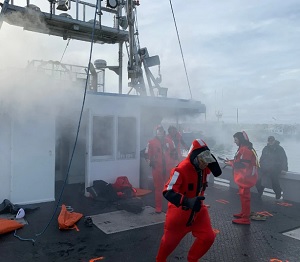
Neglected safety gear on fishing boats endanger fishermen – If it’s not maintained, it’s likely not going to work
“It’s one thing to go out and buy all this for your vessel, but if it’s not maintained it’s likely not going to work for you when you need it,” said Matthew Duffy, a safety adviser with the association. Duffy has seen survival suits full of holes, rotted ropes, and life rings tied so tightly they couldn’t be used. “We did a man-overboard drill where we got the crew involved and they got their immersion suits out,” said Duffy. “One crew member opened it up and there was a squirrels’ nest in one of them, you know, chewed right through the suit,,, >click to read< 07:40
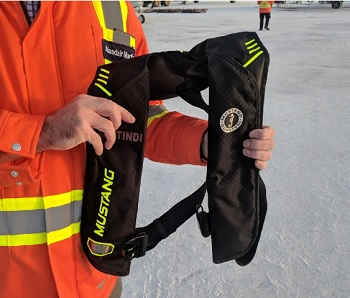
Transportation Safety Board says ‘countless’ reports show fishermen need to wear PFDs, use EPIRB emergency beacons
Transportation Safety Board of Canada (TSB) investigator Chris Morrow said it has concluded many times that fishermen need to wear personal flotation devices (PFDs) and they have to have emergency beacons on board. He said the investigation into the capsizing of the Ocean Star II lobster  boat found those to be consistent issues. An emergency beacon, known as an electronic position indicating radio beacon or EPIRB, might not have helped the crew aboard the Ocean Star II, but Morrow said they were in the water a long time without PFDs.,, On May 5, 2018, > Richard Moreau and Liz O’Connell <drowned after their small crabbing boat capsized near Port Medway, N.S. >click to read< 14:40
boat found those to be consistent issues. An emergency beacon, known as an electronic position indicating radio beacon or EPIRB, might not have helped the crew aboard the Ocean Star II, but Morrow said they were in the water a long time without PFDs.,, On May 5, 2018, > Richard Moreau and Liz O’Connell <drowned after their small crabbing boat capsized near Port Medway, N.S. >click to read< 14:40
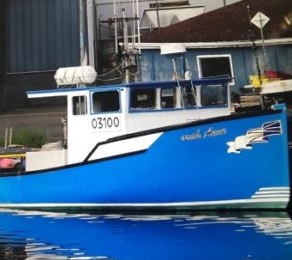
The Transportation Safety Board of Canada is investigating the incident involving F/V Sarah Anne
On its website, the TSB said the investigation will consist of three phases. First, investigators will examine the wreckage and site of the incident and collect any pertinent information. The investigation will be led by Shannon Pittman. The Sarah Anne and its crew left early on the morning of May 25 to fish crab but did not return.,, The bodies of Edward Norman, Scott Norman, Jody Norman, and Isaac Kettle have been recovered. It is known that the Sarah Anne didn’t have an emergency position-indicating radio beacon, or an EPIRB, on board. The vessel had a two-way radio instead, as regulations didn’t require it to have an EPIRB. >click to read< 18:40
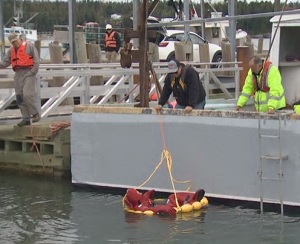
New rules in works to lift safety standards in fishing industry
Last year was the deadliest year for the Canadian fishing industry in more than a decade. Seventeen people died aboard fishing vessels in 2018, the most since 2004, prompting the Transportation Safety Board of Canada to sound the alarm about the industry’s safety culture. As it stands, fishing vessels are not considered a workplace, meaning they don’t adhere to any WorkSafeNB compliance requirements. Proposed legislative amendments would give captains binding safety obligations. >click to read< 08:07
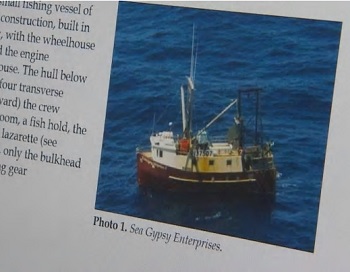
10 years after lives lost in Sea Gypsy sinking, safety regulation still not enacted
Ten years after the sinking of a small fishing vessel off the coast of Newfoundland, Sea Gypsy Enterprises off the coast of Newfoundland, a safety measure that was highlighted by the Transportation Safety Board of Canada in the wake of the incident has still not been enacted.,, The Sea Gypsy Enterprises sank 130 kilometres east of Cape Spear on Sept. 12, 2009. Three fishermen were rescued, the body of a fourth crew member was recovered from the scene, and another man was lost at sea. >click to read< 09:00
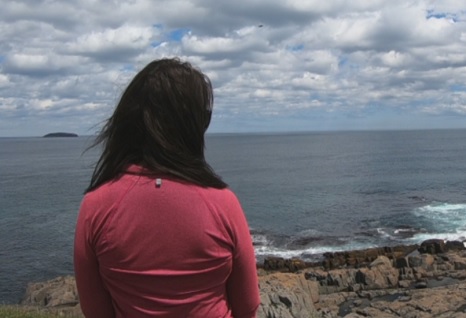
From grief to gratitude – April McCarthy’s husband was lost at sea
April McCarthy walks down a gravel path in the cemetery in Tors Cove, a small community on Newfoundland’s Southern Shore, towards her husband’s grave. She picks at some of the weeds that have crept into the site, that’s boxed in with a wooden frame, filled with white stones. Flowers and ornaments line the base of Chris McCarthy’s black tombstone. But his body is not buried here.,,, Sept. 12, 2009, It was a Saturday morning, and the Sea Gypsy was heading in with a full load of shrimp. Around 11 a.m., the boat started to slow. It was taking on water. >click to read< 08:19
10 years after lives lost in Sea Gypsy sinking, safety regulation still not enacted – >click to read<
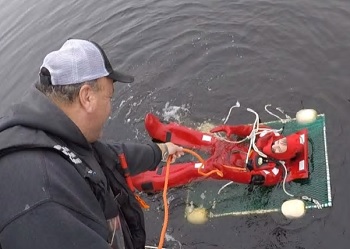
Fishermen train for a rescue in an industry full of danger
The thick red neoprene of my survival suit pressed my nose flat against my face, as I flopped into the makeshift rescue rig. A winch above strained to pull me from the dark water. The rope snapped. I plunged back down, spat out salty water and bobbed to the surface. “And that’s why we do the drills,” said Matthew Duffy, a safety advisor with the Fisheries Safety Association of Nova Scotia. Duffy stood on the boat above me in Port Mouton, N.S., next to a sheepish captain who later vowed to buy a new rope. On an adjacent wharf, dozens of fishermen watched our mock rescue. >click to read<12:41

Transportation Safety Board of Canada – Operating in poor weather conditions led to the 2016 fatal sinking of fishing vessel Pop’s Pride
In its investigation report (M16A0327) released today, the Transportation Safety Board of Canada (TSB) found that adverse weather conditions led to the sinking of the small open fishing vessel Pop’s Pride and the loss of life of its four occupants in September 2016, off the coast of Newfoundland and Labrador. The report also highlights the continued need for focused and concerted action by all levels of government and industry members to fully address the safety risks and deficiencies that persist in Canada’s fishing industry. click here to read the press release 10:46
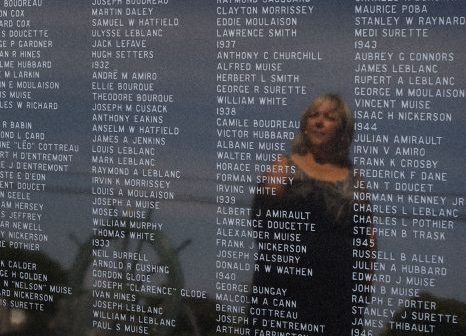
Sea Change – The Struggle for Safety in Fishing, Canada’s Deadliest Industry
Despite safety gains in many other industries, fishing continues to have the highest fatality rate of any employment sector in Canada. Even as the long lists of the dead continue to grow, regulators and policy-makers are challenged by the grim fatalism that pervades a world in which generations of fishermen have gone out into the sea and, all too often, not come home. In the tidy port town of Lunenburg, N.S., near the ocean’s edge, a touching memorial lists the fishermen who have lost their lives at sea since 1890. “Dedicated to the memory of those who have gone down to the sea in ships,” says the inscription on a slab of black granite, and to those who “continue to occupy their business in the great waters.” click here to read the story 12:29






